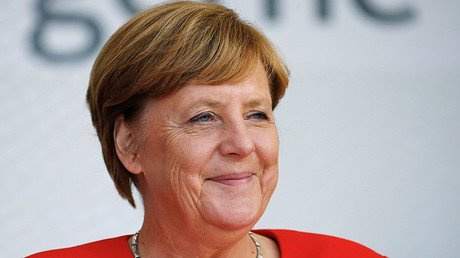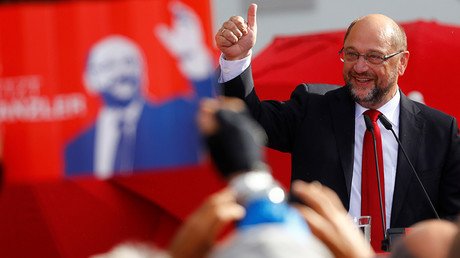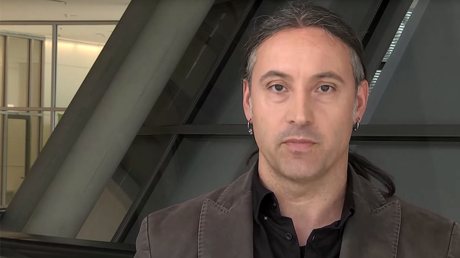Who's who in Germany's new parliament
Germany will soon discover which parties will be in the federal parliament (the Bundestag) for the next four years, as the final stage is underway. The election kicked off at 6:00 GMT on Sunday, and RT looks into who is trying to win the hearts of German voters.
FOLLOW RT's LIVE UPDATES: German elections: Will Merkel win 4th term as chancellor?
The German people will vote on Sunday to elect the members of the 19th Bundestag. Over 30 parties made it onto the ballots in at least one German state, but there are only six major political forces expected to hold seats in parliament.
READ MORE: German electoral system oddities: What you need to know about it
German politics is not very welcoming for newcomers as, other than the CDU, SPD and FDP – which formed the modern Bundestag in the 1949 election – only two new parties have managed to squeeze into the parliament. The relative newcomers are The Left (Die Linke) and The Greens, whose predecessors entered parliament in the 1980s to early 1990s. However, this election will likely result in a new power entering the German parliament – Alternative for Germany (AfD), which has seen a surge in support over the past few years.
CDU/CSU alliance
The center-right Christian Democratic Union (CDU) is led by incumbent Chancellor Angela Merkel, and the center-left Christian Social Union in Bavaria (CSU) is led by Horst Seehofer. The parties refer to each other as “sisters” and do not compete, as the CSU operates only in Bavaria, the CDU in the rest of the country.
The alliance has recently seen a rift over a number of issues, including Merkel’s open-border policy, which has been criticized by Seehofer on numerous occasions. While the two appear to have reconciled their differences on the issue, there are other unresolved problems. Seehofer has threatened to not join Merkel’s coalition if she pushes for a ban on internal combustion engines, which would undermine Germany’s automotive industry.
The CDU/CSU alliance is expected to score 36 percent of the votes, according to the latest polls, compared to 41.5 percent in 2013. The popularity of the bloc took a major hit during the migrant crisis, dropping to 32 percent at its height. Merkel and the alliance, however, managed to regain lost ground ahead of the election.
Social Democrats
The center-left Social Democratic (SPD) party experienced a major surge in support this spring when it chose Martin Schulz, the former president of the European Parliament, as its new leader. But while in February and March, the party’s approval ratings reached those of the CDU/CDU, they plummeted ahead of the election to nearly the lowest in the party’s history. In May 2017, the SPD lost control of the major state of North Rhine-Westphalia in a state election.
Schulz is seen as a controversial figure in German politics. His troubled early years, failed soccer career, and subsequent problems with alcohol, allow the party to present him as a ‘man of the people’ who has personally experienced the hardships of the average man. His career as a top EU bureaucrat, however, overshadows this image. While holding the post of President of the European Parliament, Schulz was plagued with allegations of living in excessive luxury at the expense of taxpayers, as well as protecting European Commission President Jean-Claude Juncker by blocking an investigation into a Luxembourg tax scandal.
Alternative for Germany
The right-wing Alternative for Germany (AfD), founded in 2013, is expected to win seats in parliament for the first time in its history. During the previous election, AfD failed to pass the five percent threshold, but its popularity has surged over the past two years due to the migrant crisis. The party advocates strict border control, forced deportation of migrants, and other policies generally perceived as being anti-migrant.
Numerous scandals have plagued the party. Its leaders – Alexander Gauland and Alice Weidel – as well as other members, have made statements in the past which have drawn accusations of being “racist,”“Islamophobic” and even “Nazi” from German Muslims and left-wing politicians. However, the AfD is still on the rise in Germany, enjoying 11-percent support according to recent polls.
READ MORE: German AfD branded ‘Nazis’ after it says Islam is ‘unconstitutional’
Free Democratic Party
One of the oldest German parties, the liberal pro-business Free Democratic Party, fell out of the Bundestag in 2013 for the first time in its history, failing to reach the five-percent threshold.
Afterwards, the party elected a new chairman, Christian Lindner, who led a successful campaign for the 2017 election in North Rhine-Westphalia, perceived as a “rehearsal,” for the federal elections. The party is expected to rejoin the Bundestag, enjoying 10-percent nationwide support.
The Left
While the AfD is often branded a ‘far-right’ party, the Left Party (Die Linke) is sometimes referred to in the media as ‘far-left.’ The Left, however, refer to themselves as the “only” left-wing opposition party.
Sahra Wagenknecht, who is both the candidate and the face of the Left Party, has seemingly ruled out having a coalition with the SPD and the Greens, promising to fight for the party’s vision of Germany. She has been a fierce critic of Merkel’s open-door migrant policy and the participation of German troops in overseas wars.
The party has not experienced any major shifts in support since the previous election, and is currently expected to gain around nine percent of the vote.
The Greens
The Green Party of Germany (Alliance 90/The Greens) enjoys eight-percent nationwide support, effectively the same as in previous elections, and is expected to pass the five percent threshold. The party advocates progressive ideas and policies, such as LGBT rights, generous welfare, and drug legalization.
It is led by Katrin Göring-Eckardt and Cem Özdemir.














